Croatia Local Elections To Cost Over €13.3m, Says State Election Commission Rep
April 18, 2021 - The upcoming Croatia local elections on 16 May should cost over 100 million. A member of the State Election Commission (DIP), Slaven Hojski, said on Saturday, announcing that the Croatian Public Health Institute (HZJZ) would issue recommendations for local elections.
"These are costly elections," Hojski said in an interview with the HRT public broadcaster, underscoring that the elections will be held in two rounds: on 16 May and the runoffs for mayors and county heads two weeks later, 30 May.
Hojski told the HRT broadcaster that the government had endorsed the DIP''s proposal to increase fees for polling committee members.
He said that there would be about 14 million ballots in the first round, 30 tonnes of paper will cost about five million kunas. Ten million kuna is for IT support, and 65,000 polling committee members at 6,500 polling stations receive fees. The chairperson is paid HRK 450, and a polling committee member is paid HRK 350 per round.
The fees for seven thousand election commission members range from two to six thousand kunas, depending on the number of polling stations in their remit.
As for the fact that the elections are taking place during the coronavirus pandemic, Hojski said that two recommendations of the Croatian Public Health Institute were in force -- regarding the work of electoral bodies and collecting signatures.
"Last year, the situation (concerning the parliamentary elections) was similar, and DIP received candidacies in the Croatian parliament. They (candidacies) are submitted at 576 locations, which is a bigger challenge since we have that many local, regional government units. All our polling committees have been instructed on how to organize work concerning the pandemic, and I think there will be no problems," he said.
As for collecting signatures, which began yesterday and will last until midnight on April 29, the HZJZ issued recommendations according to which stands for collecting signatures. People must keep their distance while queuing. Face masks are obligatory outdoors and a disinfectant must be provided.
Hojski said that DIP would issue guidelines on how people in isolation or self-isolation will vote for the entire election day, 16 May.
He said that those people would cast their ballot in the same way as in last year's parliamentary polls, so those in isolation and self-isolation would report to the election commission three days before the elections or to the polling committee on the day of the election.
Representatives of the polling committee will come to their house, and those infected will vote with the help of a trusted person, and polling committee members will not be in direct contact with them.
Polling station in tents in earthquake-hit areas
Hojski said that DIP had detected 51 polling stations out of function in Sisak-Moslavina County due to the 29 December earthquake, and a replacement location, a tent, has been found for 26 of them.
"The polling station will be in a tent with all logistics, and civil protection will provide tents, logistics, generators, lighting, and everything needed for the elections to be held properly," he said.
For more about politics in Croatia, follow TCN's dedicated page.
Croatia Coronavirus Update: 1,565 New Cases, 39 Deaths, 2,142 Recoveries
April 18, 2021 - Croatia coronavirus update: out of 7,535 tests performed for coronavirus in Croatia in the last 24 hours, 21%, 1,565, have turned out to be positive, the national COVID-19 crisis management team reported on Sunday.
The COVID-related death toll has risen by 39 to 6,562.
Currently, there are 15,668 active cases of the infection, including 2,105 patients in hospitals, of whom 194 are placed on ventilators. A total of 32,040 people are self-isolating.
Since the first case of the infection with the novel virus was confirmed on 25 February 2020, Croatia has performed more than 1.7 million tests, and 307,790 people have tested positive. Of them, 285,560 have recovered from this disease, including 2,142 in the last 24 hours.
To date, under Croatia's vaccine rollout plan, more than 691,000 doses have been administered, and 552,559 people have been inoculated.
As many as 411,760 people have received the first shot of the two-dose vaccine, 138,706 have been inoculated with both doses. For 2,093 people, there is no data on which dose they have received.
For more about COVID-19 in Croatia, follow TCN's dedicated page.
Highlights of the Week: 5 Top Events in Croatia from April 12-18, 2021
April 18, 2021 – Apart from the news about TCN's CEO Paul Bradbury being sued by the Croatian National Tourist Board, this week has been full of many other exciting yet inspiring news stories. Here are TCN's five biggest events in Croatia from April 12 to 18, 2021.
With the worsening epidemiological situation and tightening measures in four Croatian counties on Monday, the week didn't start very promising nor positive. However, a lot can happen in seven days, and we list five top news stories from Croatia.
Highlights of the week: Croatian National Tourist Board sues Paul Bradbury
Croatian media have been flooded this week with the news about the two lawsuits against TCN's CEO Paul Bradbury, submitted by the Croatian National Tourist Board because of Bradbury's criticisms of their work.

Source: Telegram.hr
Namely, CNTB filed two lawsuits against Bradbury, one for a Facebook joke he posted and the other for statements he said in an article on the Croatian portal Index. There was simply no stopping talking about these controversial lawsuits that appalled and disappointed the public this week. Read all the details about the first and second lawsuits in our articles.
Highlights of the week: Rimac Automobili presented a new incredible campus
On the list of people who promote Croatia in the best possible way, Mate Rimac takes one of the leading spots. His company Rimac Automobili never ceases to surprise with the novelties, such as the latest news about constructing the impressive new campus with numerous facilities.
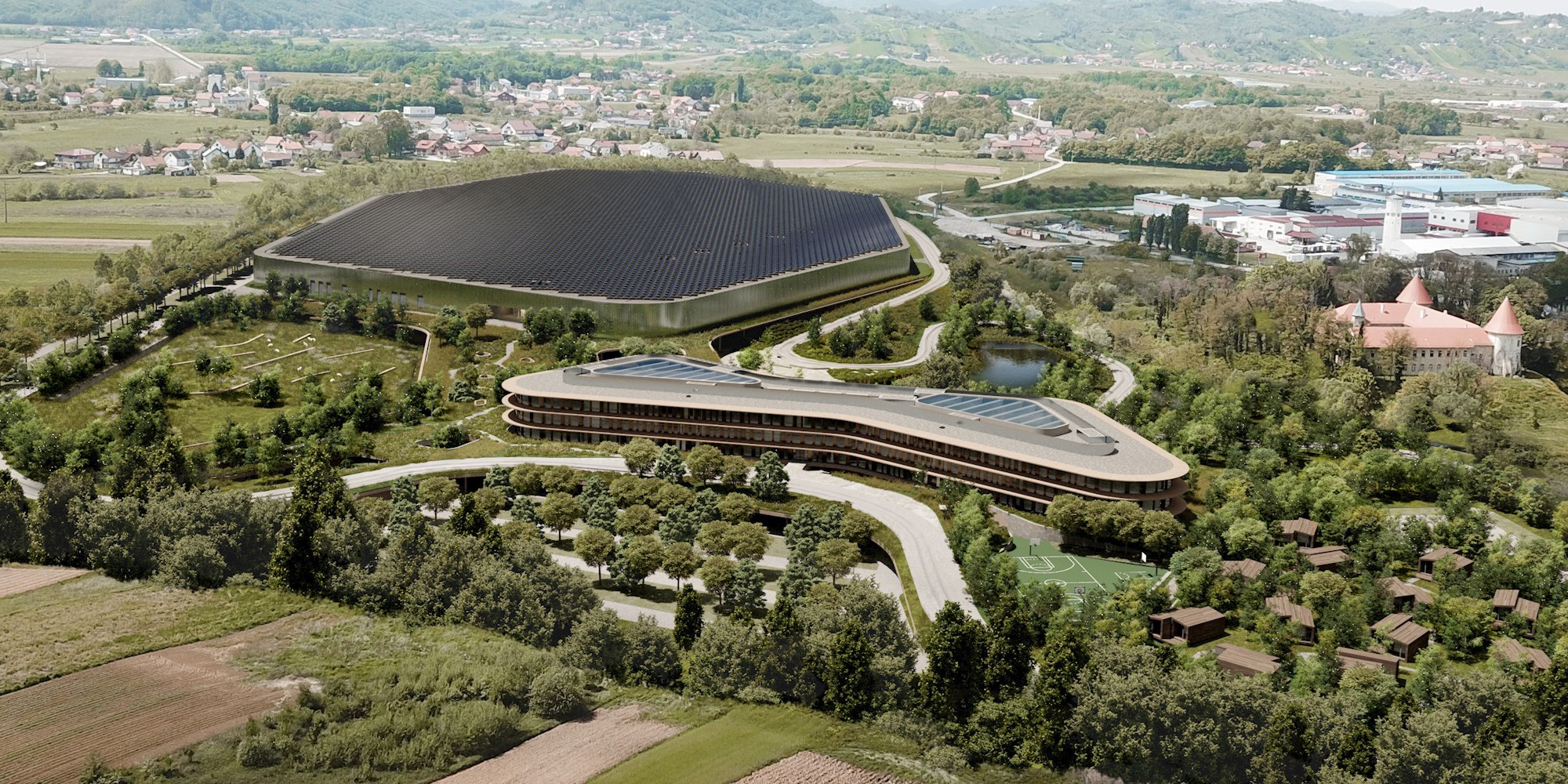
Source: Rimac Automobili
See the impressive video and photos of the forthcoming Rimac campus that stunned the whole of Croatia this week.
Highlights of the week: Many fantastic flight news for Croatia
Although all travel is currently questionable due to the epidemiological situation, hope is still restored by numerous information about flights to and from Croatia published this week.
Thus, for example, Israeli El Al and Arkia flights to Croatia continue, as well as Austrian flights, Polish LOT, Finnair, and Eurowings.
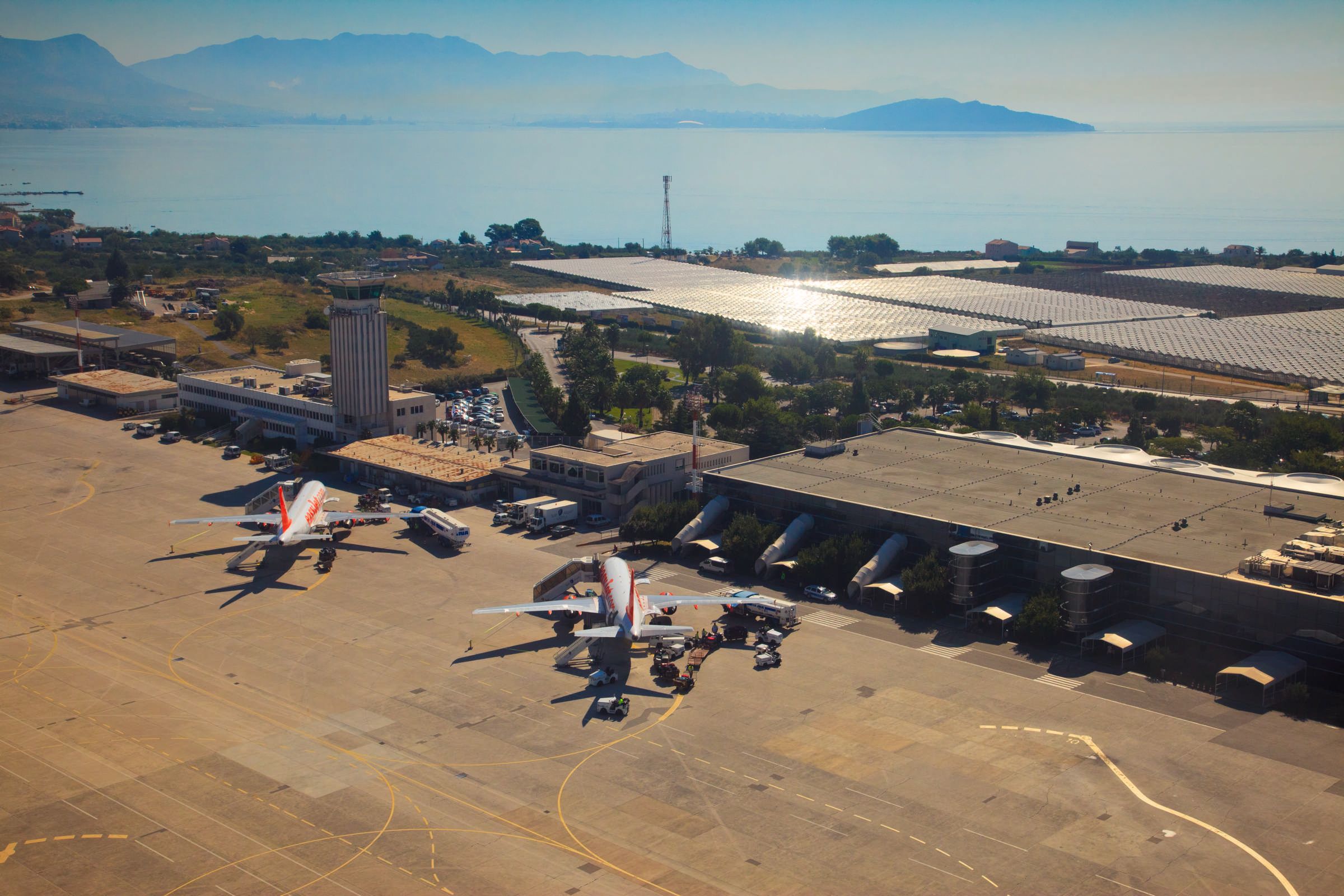
Split airport by Romulić and Stojčić
And even though Croatia will have to wait a bit longer for introducing direct flights from the USA, from this week, the travelers can get from Sarajevo to Chicago by Eastern Airlines.
Highlights of the week: Croatia women's handball national team won HEP Croatia Cup
Croatian athletes do not stop surprising us positively from week to week!
After defeating the current world champions, the Netherlands, the Croatia women's senior national team also defeated the former world champions Brazil and won the HEP Croatia Cup in Poreč.
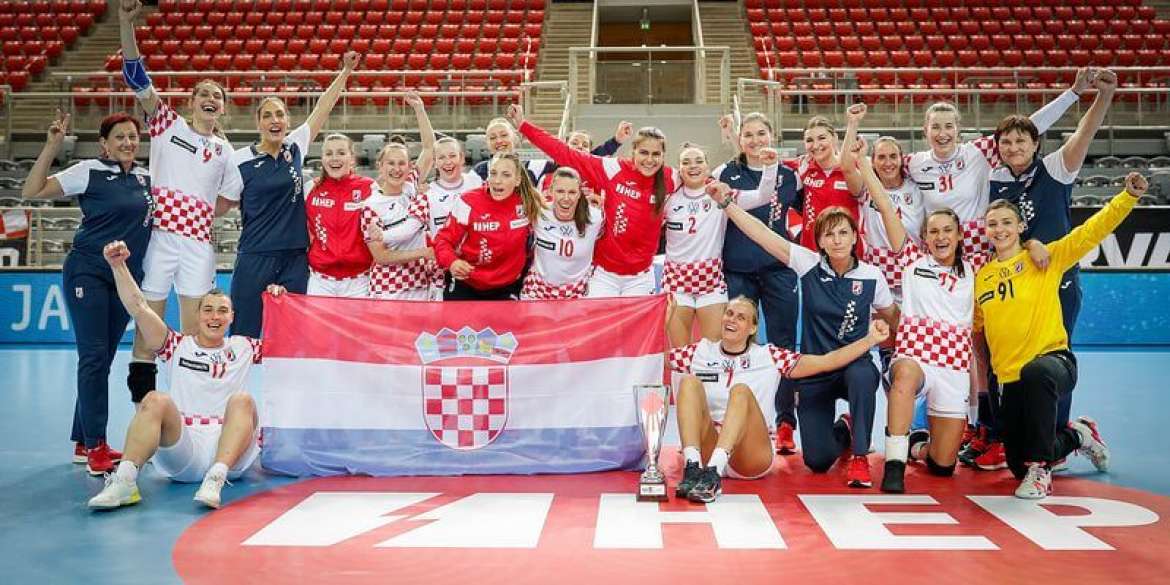
Source: Hrvatski rukometni savez
Highlights of the week: Klepetan returned to Malena again!
And to sweeten this week, the most famous Croatian love story got its happy follow-up. For the 19th consecutive year, the white stork Klepetan has returned from the south to the nest of his beloved Malena, continuing one of the most beautiful animal love stories in the world!
Spring may not have returned in the form we know, given that this week's temperatures in Croatia are more like autumn's, but it seems like the natural world is very much following its course.
To follow all news from Croatia, subscribe to our newsletter.
Dalmatian Duo Revives Ancient Salona in 3D (PHOTOS)
April 18, 2021- Ever wonder how Salona looked all those years ago? One Dalmatian duo has revived ancient Salona in 3D!
Dalmatinski Portal reports that Dalmatian duo Stipan Ujdur from Opuzen and Frane Bilić from Zadar initiated the reconstruction of another Dalmatian Roman geolocation - ancient Salona. Ujdur creates the 3D models, video animation, VR, and photo rendering, while Bilić will program the final visualizations for multimedia in the 'MediaUp' studio.
"The project is very demanding, and it is difficult to do because Salona is large, but very little researched, so only the explored localities will be processed in the scenes. So far, five scenes have been made from a total of 12 to 14," Ujdur said.
"These scenes are more or less researched, so it is possible to model them in 3D format. I hope no one will blame me for some inaccuracies or copyright. Overall, it should be almost by the end of this year at the latest," Ujdur added.
Porta Caesarea was the monumental city gate of Salona. While Salona was still within the framework of the Urbs Vetus, this gate served as the eastern entrance to the city.
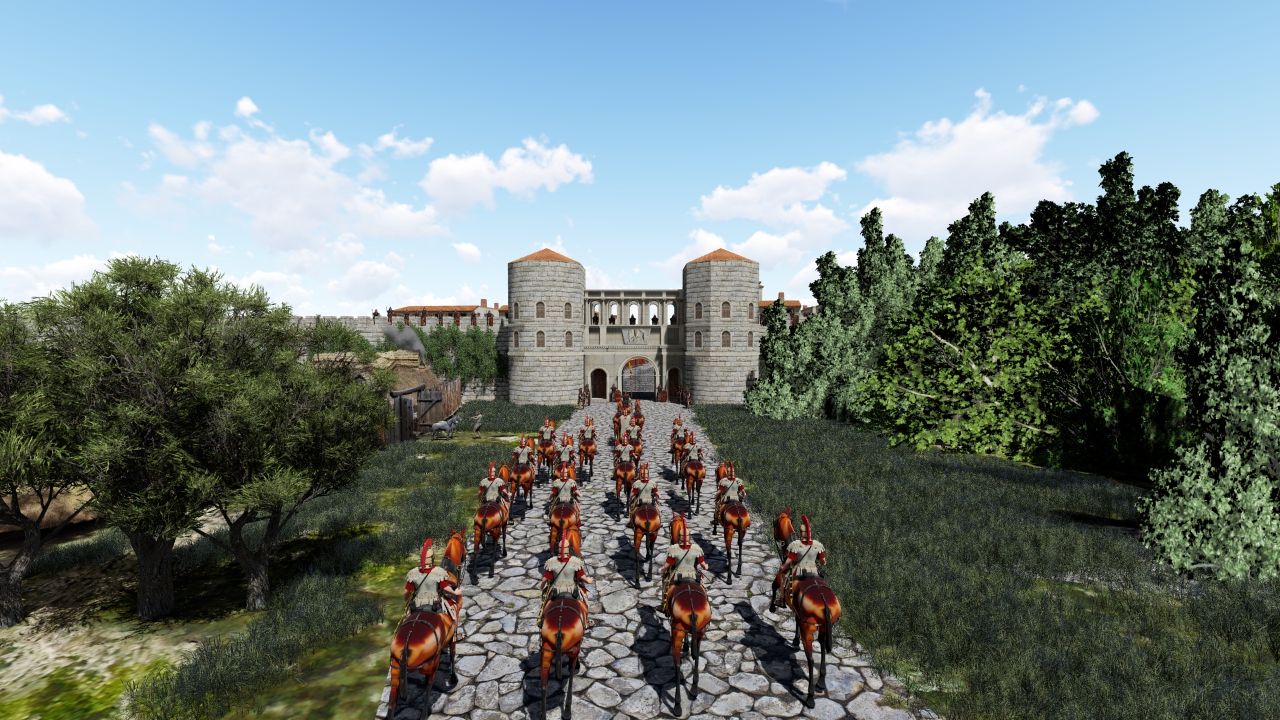
In front of them was a non-Romanesque settlement that depended on works in the city and the sale of agricultural products.
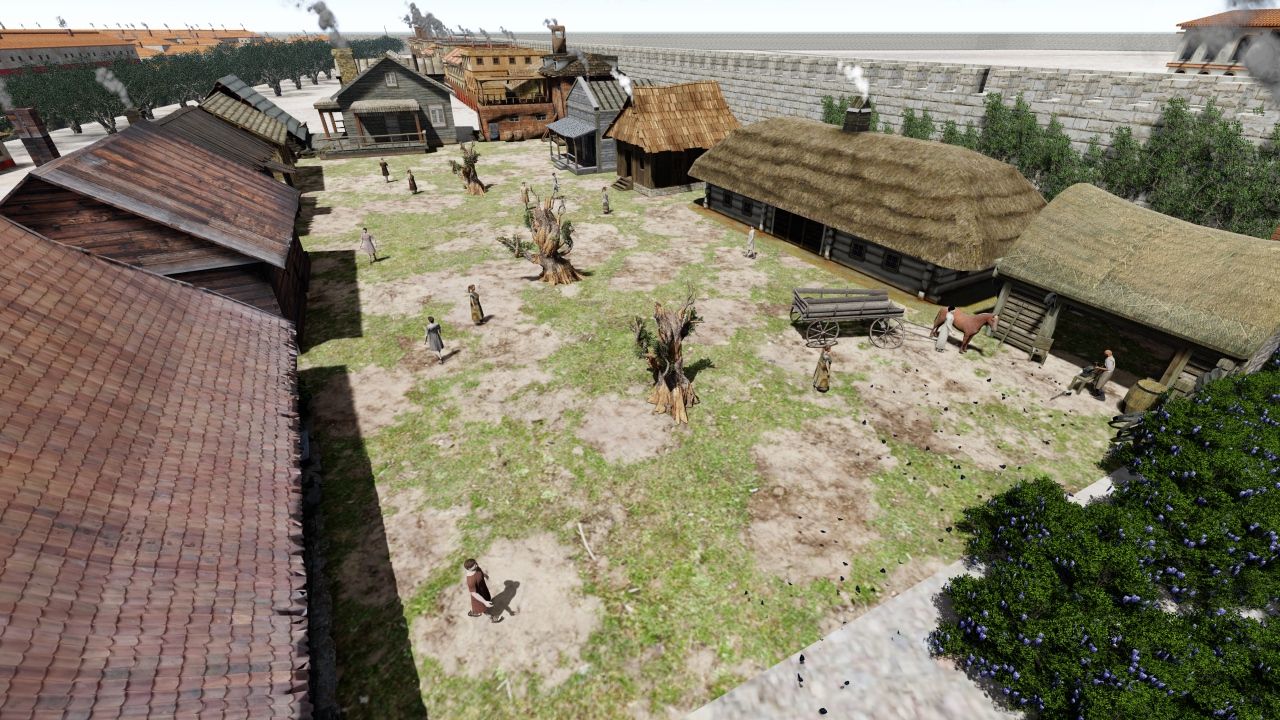
There were significant changes in front of the gates of Porto Caesarea and the ramparts. There are foundations for the city insula district; these are multi-story buildings built by the city for deserving citizens and social cases. They were usually 50 x 25 x 20 meters in size, with different variations in architecture, with public fountains for water and laundry.
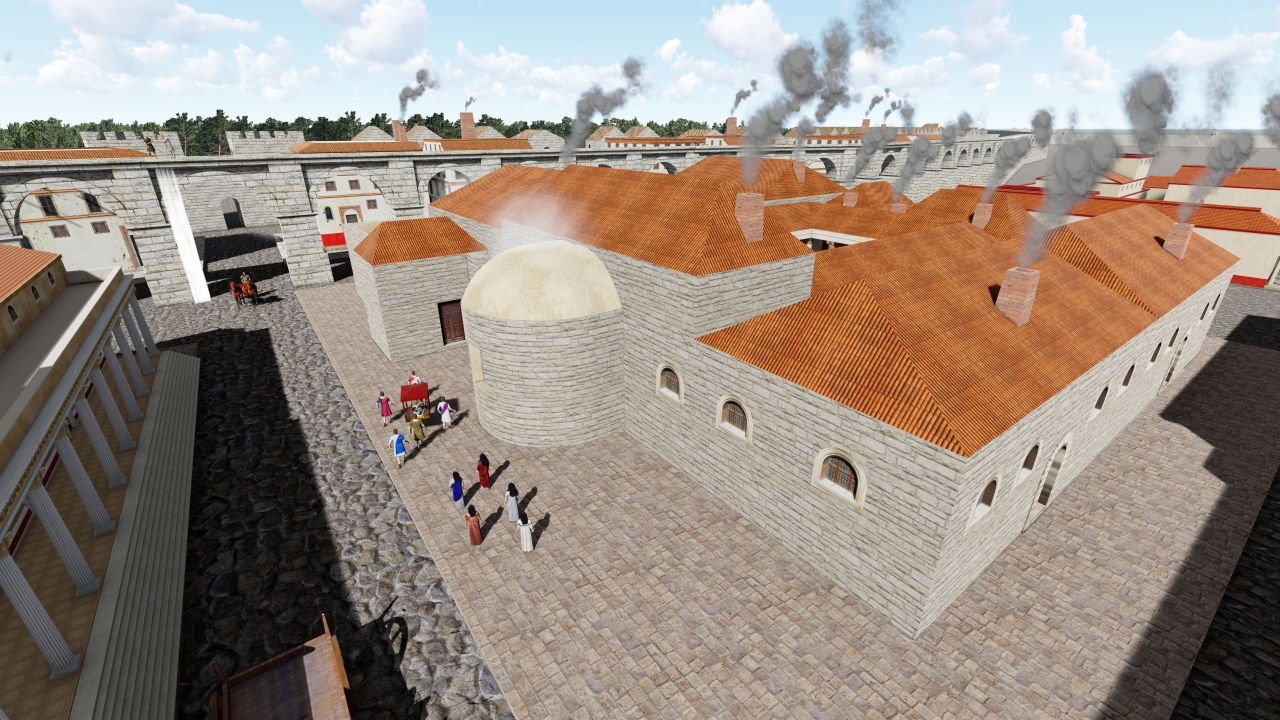
On the left, in front of Porta Caesarea, a non-Roman settlement was evicted in front of Porta Andetria, and in their place, a settlement was built for workers in the "industrial zone."
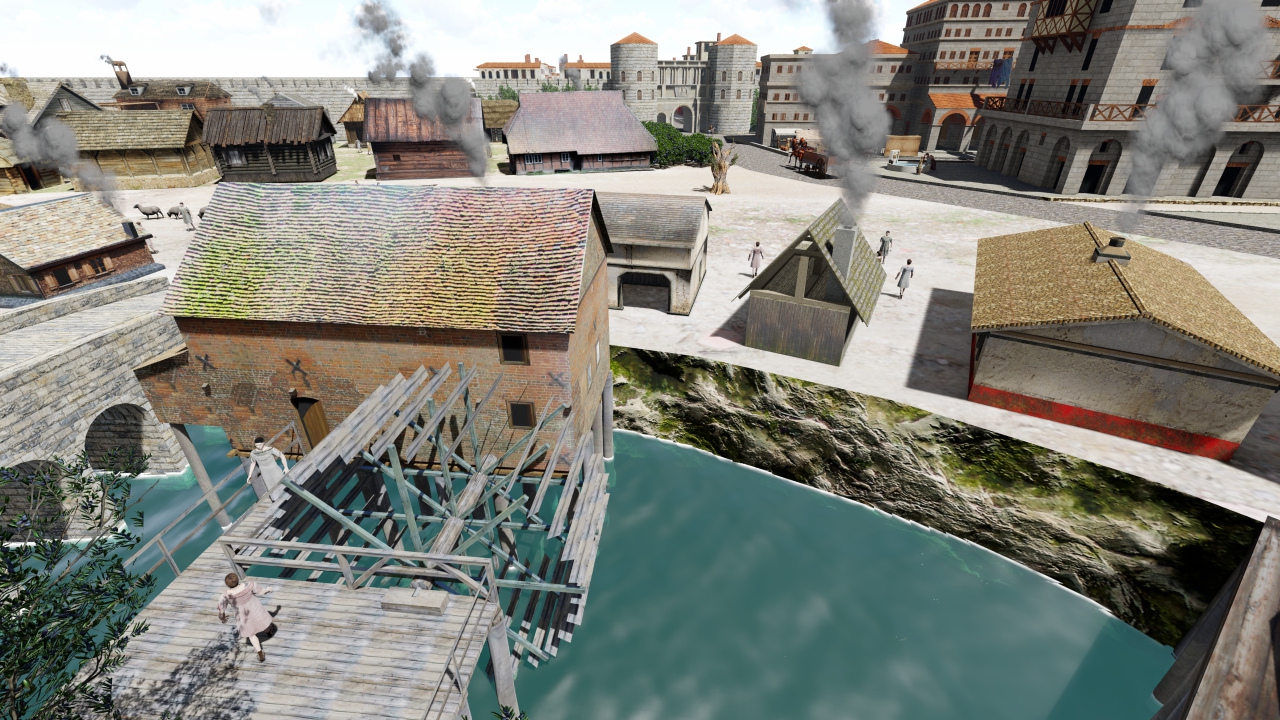
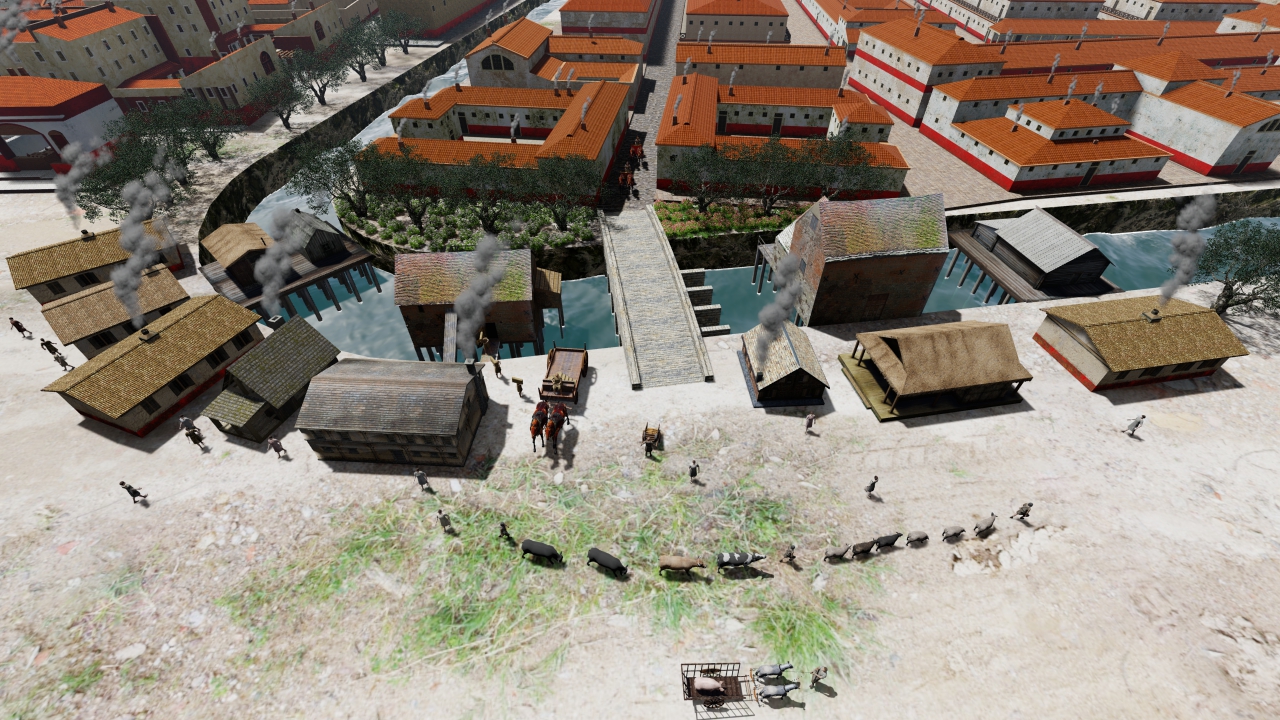
The industrial zone was near the bridge, and numerous workshops, warehouses, and dwellings were built for the workers who worked in them. There were also workshops on poles or with mills that exploited the water potential to power the machines.
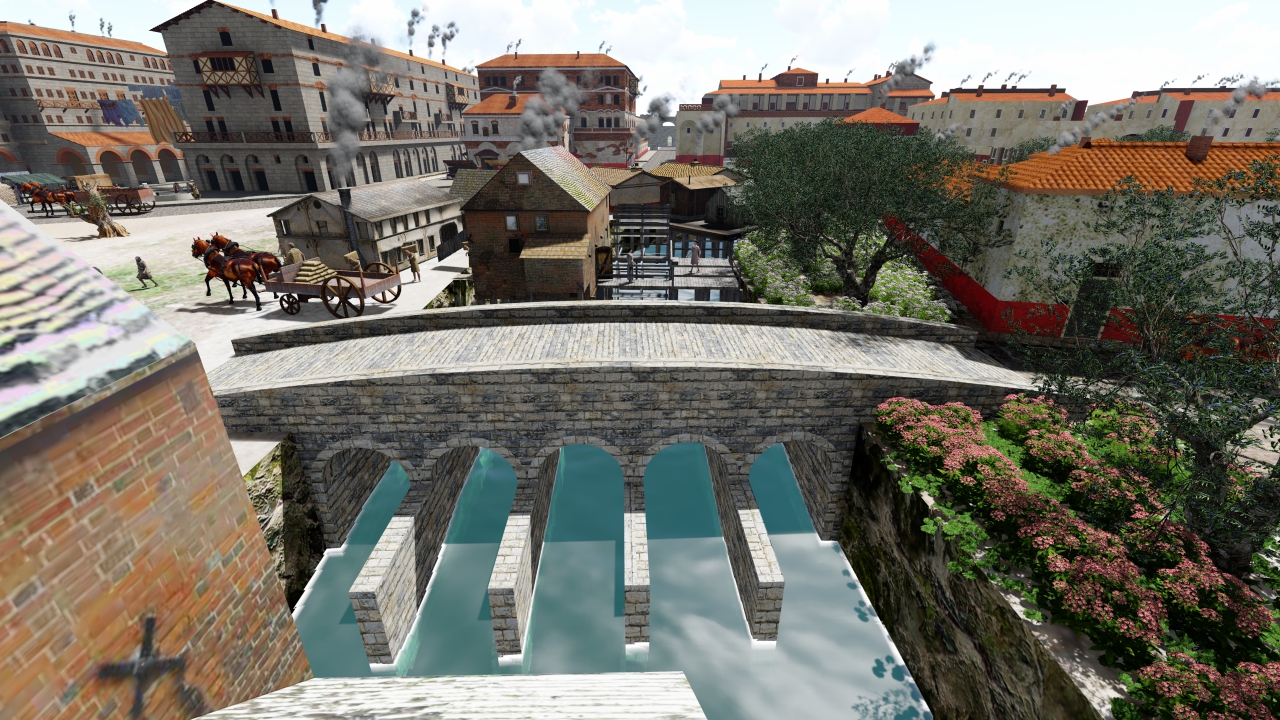
The peristyle was connected to all the rooms within the spa; this was most likely the atrium, while the building had a domus. As a rule, one entered the peristyle and from there into the frigidarium. Various bath aids were sold on the peristyle, from the latest baths to massage oils, various depilatory preparations, from razors to beeswax.
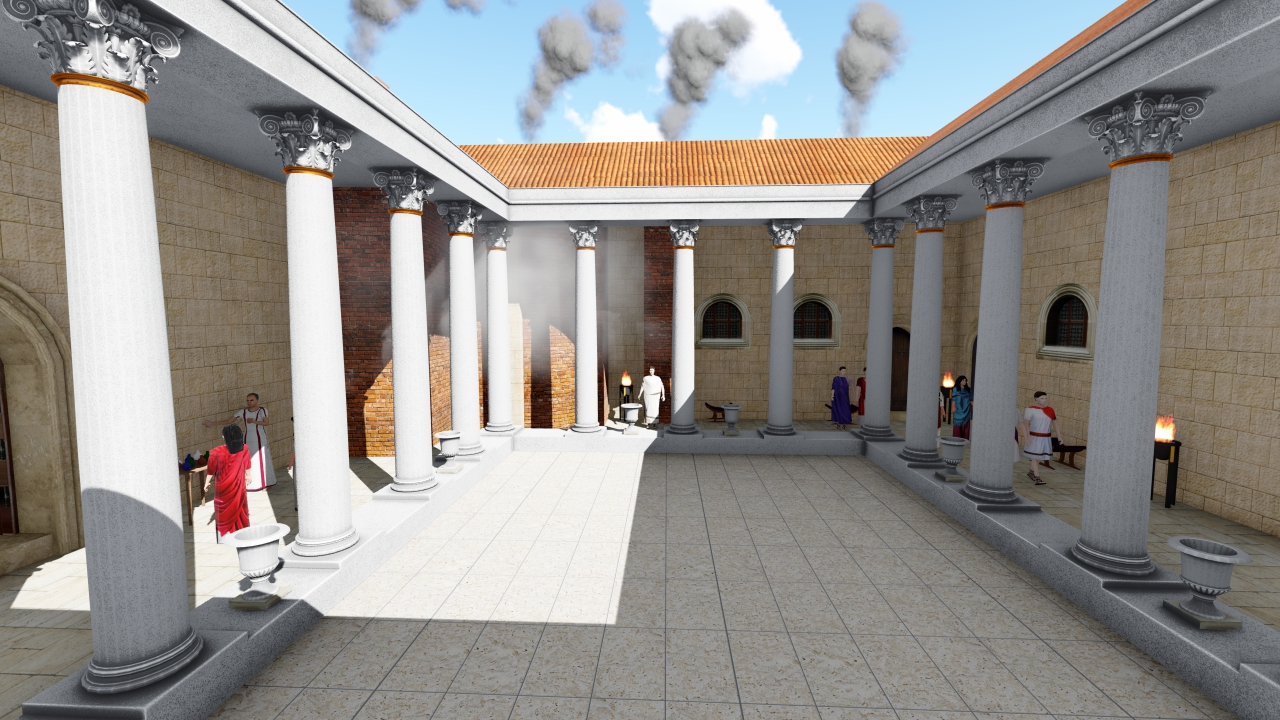
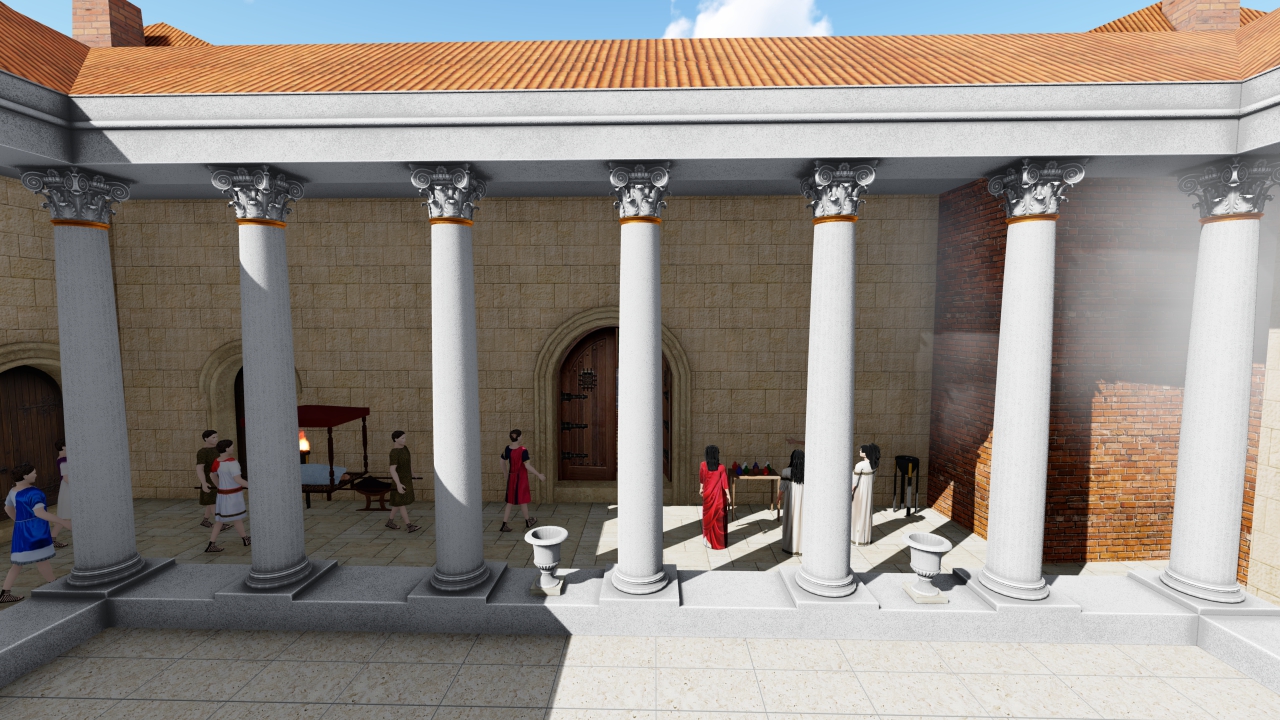
The frigidarium is a room with a pool where there is cold water, used before hot water and sauna, then at the end of all treatments to close the pores on the skin.
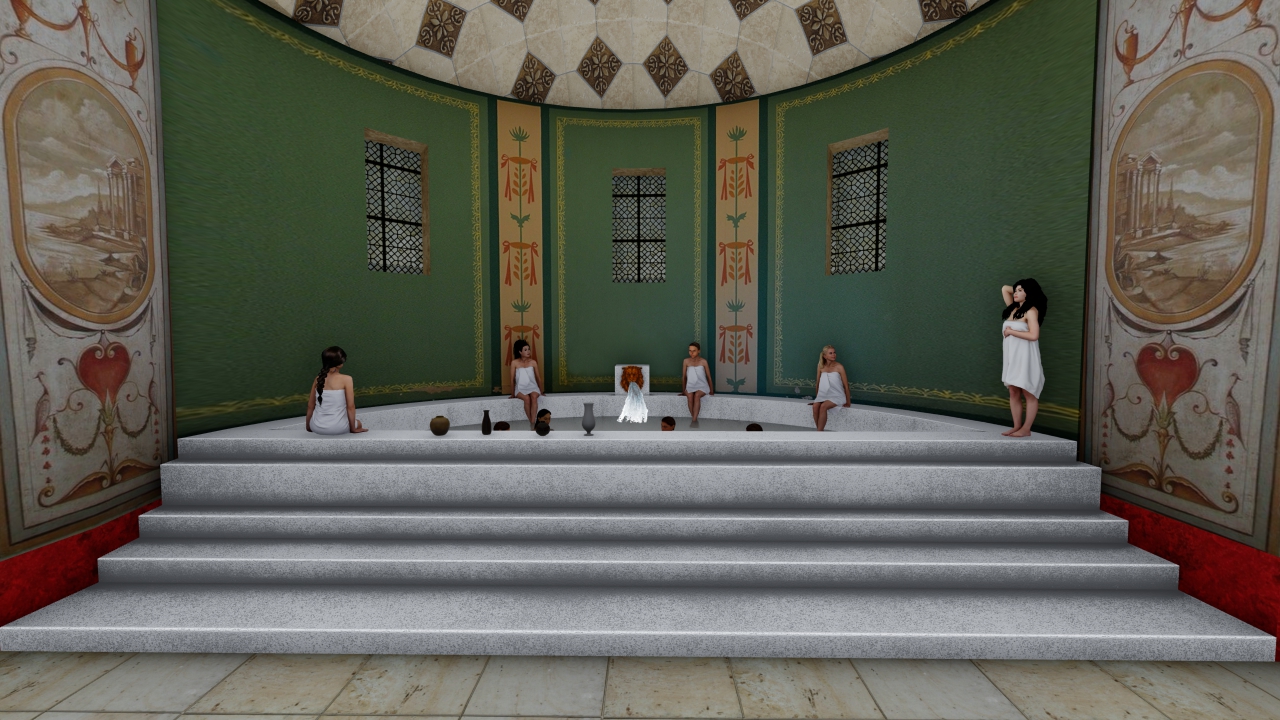
From the peristyle, one entered the frigidarium, from which one went to the left door to the locker room. After a bath in the cold pool, you'd go to the right door to the warm part of the spa. These baths were named 'balneum.'
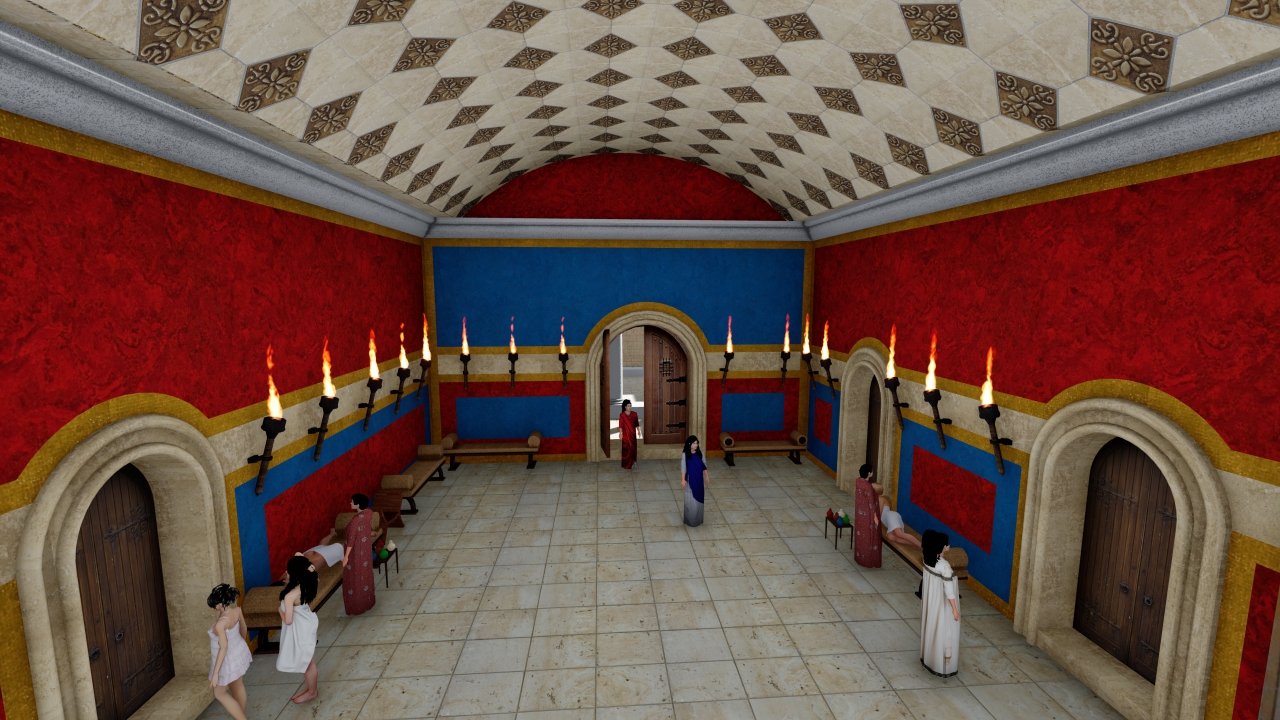
For more about lifestyle in Croatia, follow TCN's dedicated page.
Croatian Graduate Perspective: The View from Emma in Vinkovci
April 18, 2021 - Continuing our Croatian Graduate Perspective series with Emma in Vinkovci, who believes great job offers and careers that provide lots of traveling would encourage young people to stay, because "it wouldn't make you wish to leave Croatia." This is her full story.
With many young people emigrating from Croatia, what keeps those who decided to stay (at least for now)?
The emigration of young people from Croatia in search of better business opportunities and living standards, unfortunately, is a well-known story. Each of us young people in Croatia knows at least a few people from their environment who, at one point, said that enough was enough and decided to seek happiness somewhere abroad.
According to official Eurostat data, from 2015 to 2019, Croatia's population decreased by 4.26 inhabitants per 1,000 citizens only thanks to emigration. Therefore, the Croatian emigration rate is the second-worst in the European Union (after Lithuania).
These data indicate that economic prosperity influences population decisions to emigrate. Besides, due to the exodus of the young and working population, there is an additional reduction in GDP per capita that closes the cycle of poverty and decline in Croatia.
However, there are many who are aware of the poor position of young people in Croatia but still do not want to give up and decide to stay in Croatia. We're wondering what do those young people, recent graduates, think about this whole situation and what are their reasons for staying in Croatia.
We continue our series with Emma from Vinkovci in eastern Croatia.
First of all, please introduce yourself. What are you studying/what did you study? Do you have a job currently?
My name is Emma Stephanie Gaunt. I am studying costume design, and I am in my final year of MA. I am currently working as a key costumer and as a costume standby on a project for a television series.
What is it like being a student/recent graduate in Croatia during this coronavirus time?
For faculties that operate on a project basis, it has not been easy. We had very few opportunities to connect and meet new collaborators, and the main thing with this job is to be known for who you are, how you work, and what you want to do. But currently, the situation is improving, and projects are coming to be a bit unexpectedly.
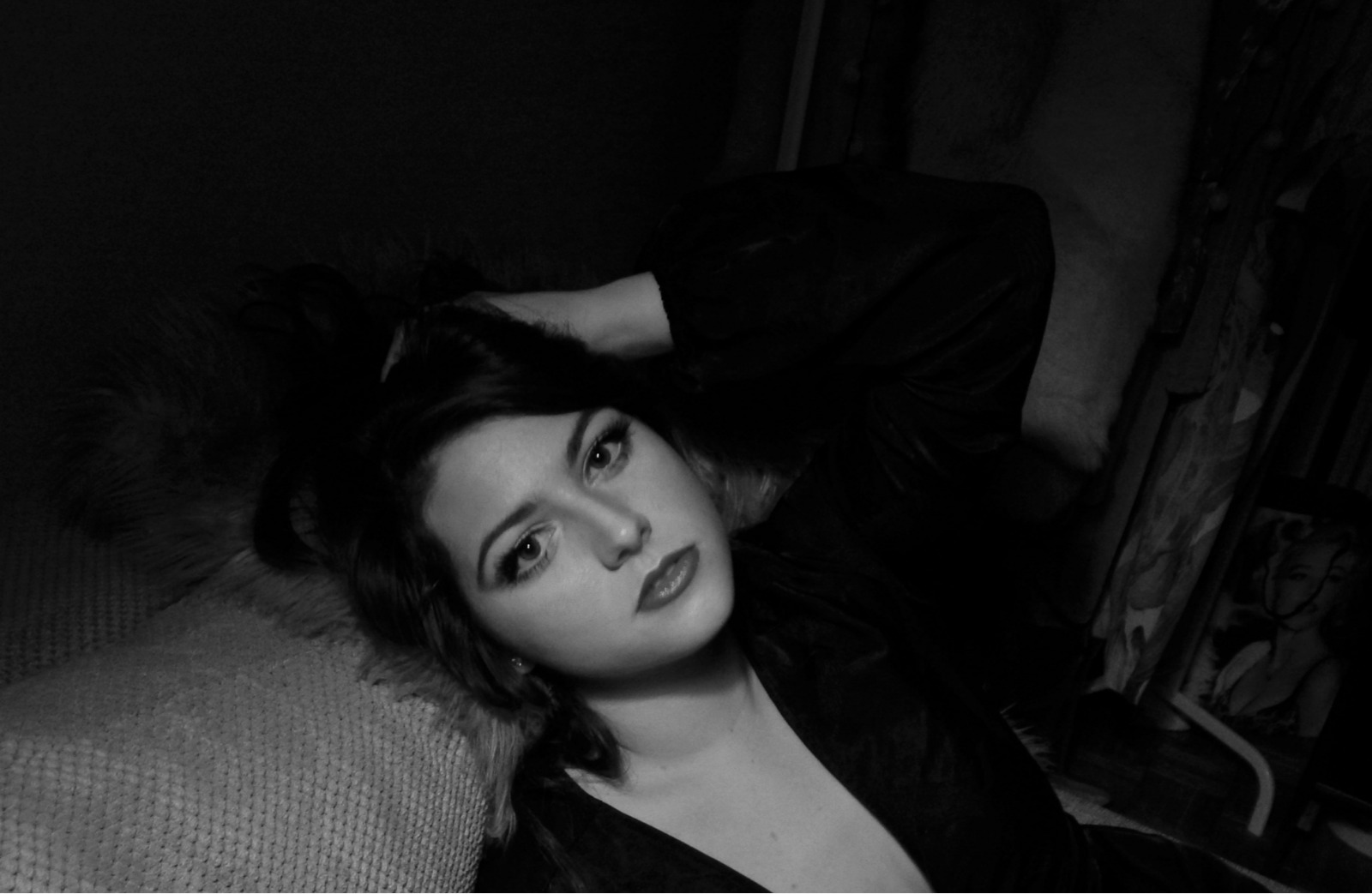
What are your experiences searching for a job in your profession in Croatia?
I haven't been actively searching for the last year because of Covid-19, and theatres aren't permitted to make new productions yet, so I am sure not many theatres need a costume assistant or wardrobe assistant in the theatre. Sometimes in this profession, jobs get offered to you. Usually, people from past projects contact you about a new project and want to include you. That has been working for me for now, but it wouldn't have happened if I have been passive in the past about my work.
What do you think of the Croatian Government's efforts to provide opportunities for graduates?
I think they are doing a fine job regarding engineering and medical students, but I don't think there is much they can do for costume design students.
Many young people your age decide to emigrate from Croatia to find a better job opportunity and/or life standard. What do you think about it?
I think they should go for it. Croatia is not a big country, and some jobs are not as wanted here as they are somewhere else. One of the main reasons for choosing costume design is to go out, travel, and improve. There is a lot of things you can learn out there. Everyone works differently.
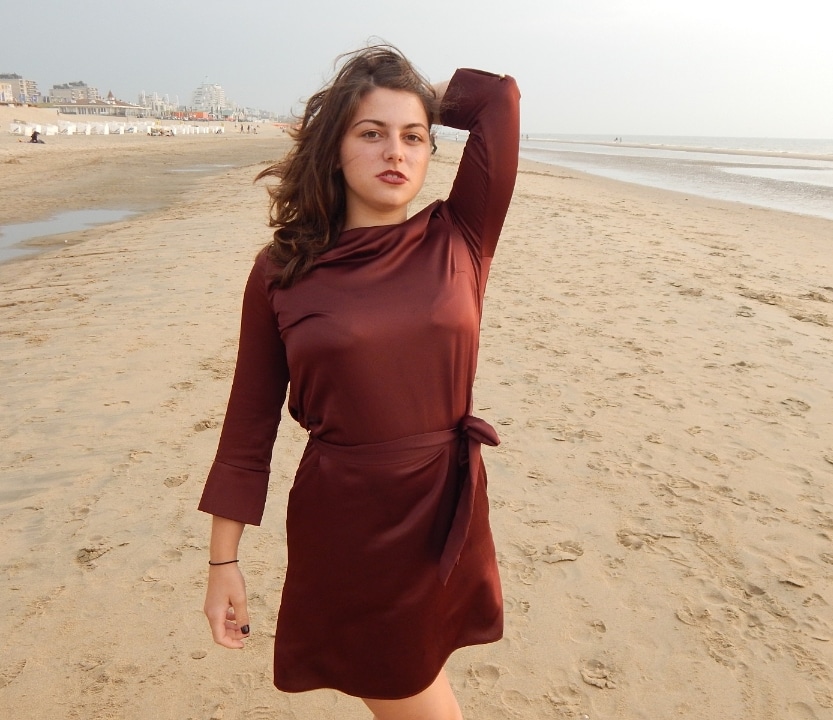
In your opinion, what would encourage young people to stay in Croatia?
I have noticed lately that primarily students attached to their family or the ones who are going to inherit a house or piece of land are optimistic about staying here. I have also noticed that lots of people who leave Croatia come back for its relaxed everyday approach and way of working and living, and of course the great weather that we have here. I think for every student, the key to staying is mainly attachment and home. I guess the thing that would encourage young people to stay are great job offers straight after university and a career that provides lots of traveling because it wouldn't make you wish to leave Croatia.
Have you ever considered moving out of Croatia and why?
Yes. I feel that Croatia is really small for me and that if I could reach more audience, I think I should. I don't have many attachments here in Croatia, so it is easier for me to leave.
As a recent graduate, what is your impression of the education system in Croatia? What do you think is good about it and what could be better?
What I like about the Croatian education system is that, unlike some other countries, we can go to high schools that educate us about a particular vocation and craft. It is very useful, and it has also been for me.
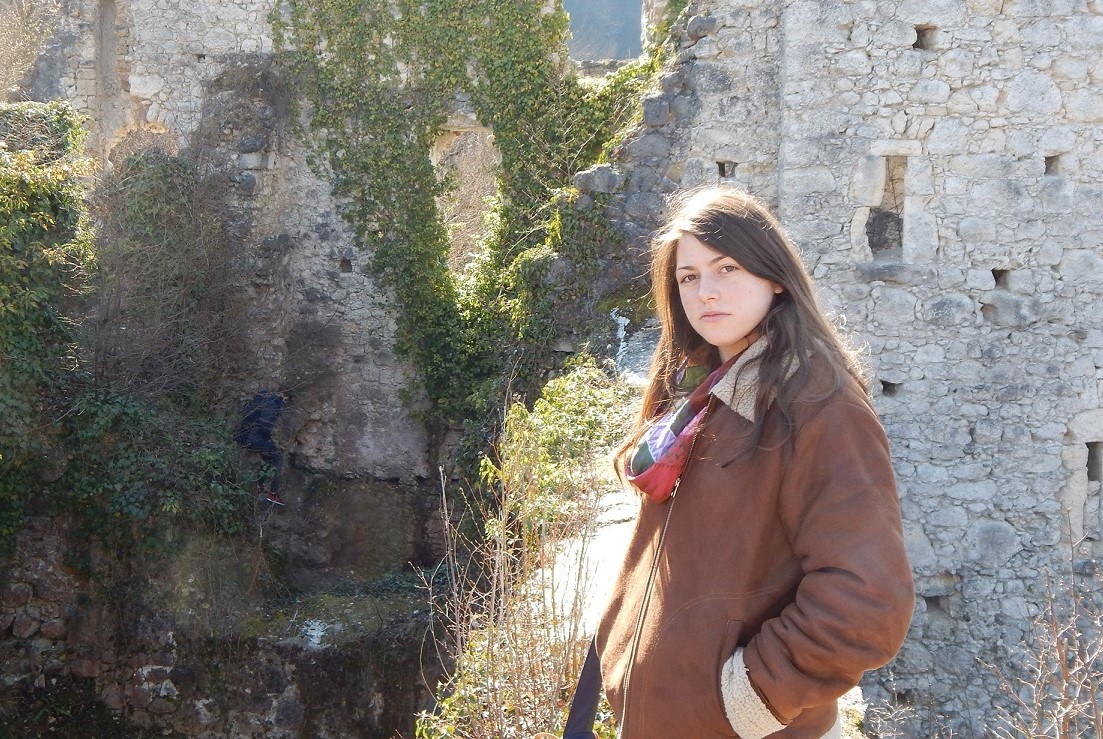
Based on your own experience, can you say that everything is possible in Croatia if you work hard, work on yourself, are educated and ambitious?
Yes, I believe it is, just some jobs here don't have the audience for it, and that can maybe be a problem, but sometimes you can reach your audience online, so it also works.
If you could change only one thing in Croatia, what would it be, and why do you think it's important?
The thing I really don't like in Croatia is the old communist system stemming out in different ways and functions. For instance, last year, during the first lockdown, people were being checked if they stayed at their homes by the police a few times in 2 days for some people. Even people who lived during Tito's time still stand by his politics.
As a young Croatian, what are you most proud of in Croatia?
The country's beauty and the lifestyle. And of course, our football players.
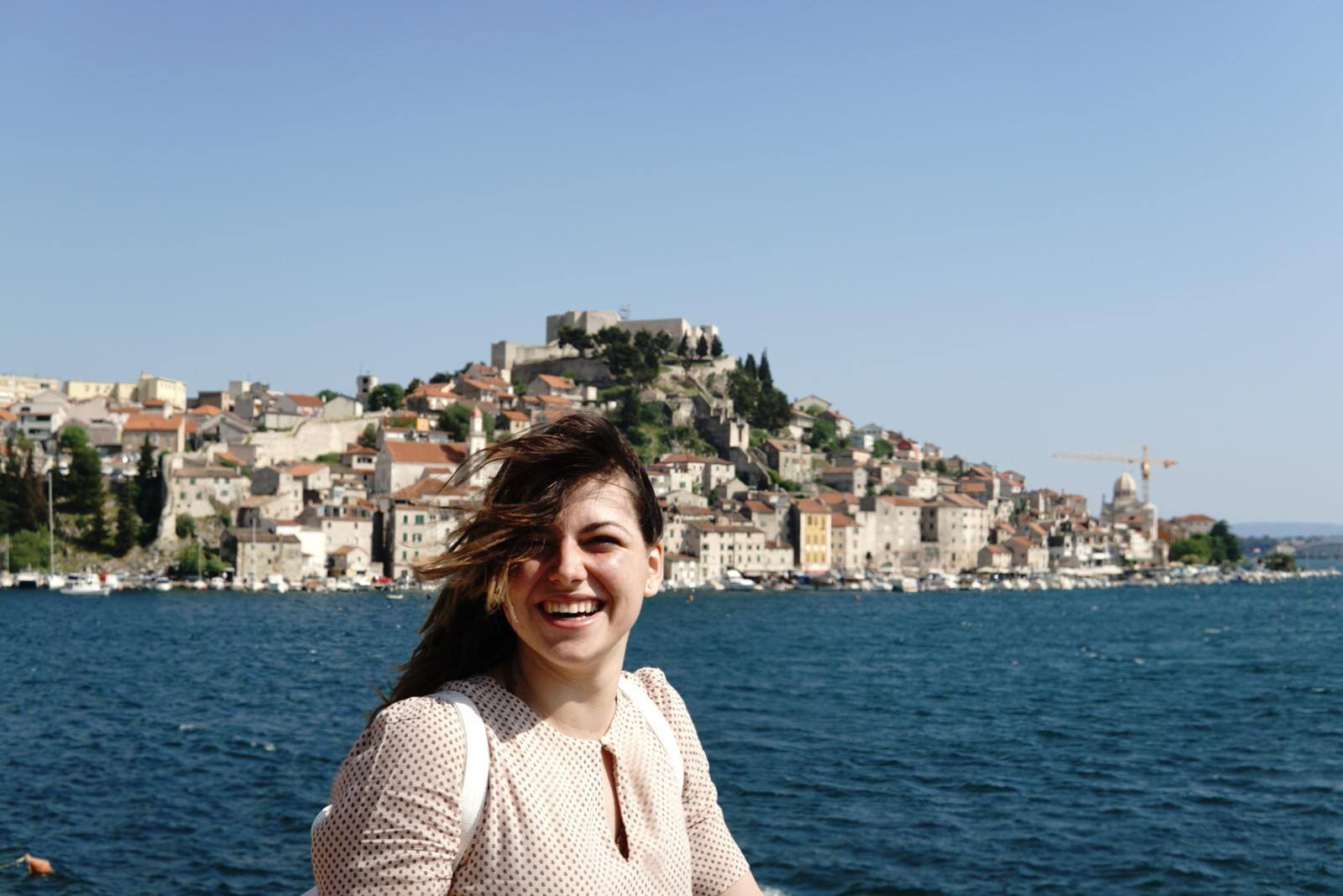
Are you optimistic or pessimistic about the future of Croatia, and will it be a better or worse place for your children?
I think Croatia is one of the best countries to raise your children. It is a really safe and innocent country. I believe it will be a better place.
Are you a student or recent graduate who would like to contribute your voice and experiences to this series? If yes, please contact This email address is being protected from spambots. You need JavaScript enabled to view it. with the subject "Graduate."
To read more from the Croatian Graduate Perspective series, follow TCN's dedicated page.
Explore Croatia with FlixBus: New Campaign Targets Domestic Tourists
April 18, 2021 - A new FlixBus campaign, "Explore Croatia with FlixBus," launched earlier this week, encouraging travelers to explore the beauties of Croatia but also to promote Croatia as a tourist destination.
HRTurizam reports that FlixBus launched the new campaign in cooperation with Croatian private landlords, hostels, restaurants, and cultural institutions.
The campaign aims to encourage domestic travelers to explore the beauties of Croatian cities and towns, emphasizing numerous local tourist attractions. Through FlixBus social networks that bring together a large community of travel enthusiasts, not only in Croatia but also in Europe, the campaign aims to promote Croatia as a desirable tourist destination.
"The past year has been a challenge for everyone, and despite the great desire to travel, we have had to adjust our life habits to the many restrictions imposed. At the moment, it is a bit more difficult for us to decide on some long-distance trips, but at the same time, we have the opportunity to get better acquainted with what is closer and easily accessible to us. For this reason, we have decided, in cooperation with numerous Croatian partners, to launch a campaign that celebrates the beauties of cities and towns throughout Croatia," said Petra Trojko, communications manager for FlixBus CEE S region.
In cooperation with local partners, 10 destinations throughout Croatia will be presented across 10 weeks. Every week, two lucky travelers will be able to win a weekend trip with accommodation and other facilities in the destination.
The campaign began on April 15 with the message 'Everywhere is beautiful, but traveling in Croatia is the most beautiful.'
The campaign starts in Split, and the perfect weekend for two can be spent in Zagreb, Varaždin, Zadar, Rijeka, Knin, Imotski, Plitvice Lakes, Karlovac, and Osijek.
Namely, every week one destination will be presented, which will become a weekend destination for two happy passengers with provided transport, accommodation and interesting facilities of local partners. Thus, all those who join the campaign will have the opportunity to find out which city lies on seven rivers surrounded by nine mountains, which has the most beautiful sunset, how the Egyptian Sphinxes arrived in Dalmatia, and more.
An excellent example of cooperation and synergy between FlixBus and other partners in the destination, from the accommodation, museums, restaurants, and tourist boards, working together to promote the destination.
To learn more about taking the bus in Croatia, follow our Total Croatia page.
For more on travel in Croatia, follow TCN's dedicated page.
Zagreb Selfie Room Becomes Reality, First of its Kind in Croatia
April the 18th, 2021 - The ongoing pandemic has more or less halted travel, at least travel for leisure in Europe, and you might be longing for that feeling of taking a selfie in front of some beautiful scenery or ancient building. You might just be bored of taking photos of yourself in your living room. Or you might just not be that into yourself. Either way, the very first Zagreb Selfie Room (yes, you read that right) is here to save the day.
As Poslovni Dnevnik/Sergej Novosel Vuckovic writes, if you want a nice selfie, you don't necessarily have to go to London and pose outside a classic red phone box, or go and pretend to push the leaning tower of Pisa over for the billionth time, now you can take a picture in the first Zagreb Selfie Room, located at the Zagreb Fair (Zagrebacki Velesajam).
Yesterday, the first Zagreb Selfie Room opened at the aforementioned location, announced as the very first space in all of Croatia to offer a unique and special, interactive photo experience.
The Zagreb Selfie Room project was conceived and implemented by entrepreneur Kruna Josimovic, the owner of the Children's Entertainment Centre, who already runs the first Croatian Escape Room, and has now arranged a 200-square-metre space on the first floor, with eight sets, creating different interiors for selfies.
"The space is designed as a party room, for kids, a little older, teenagers and even girls and boys, in fact for everyone, to come, support the idea and take photos. We have a lot of props - lamps, neon lamps, flowers, bathtubs, so that the photos turn come out as something original and as good as possible,'' said Josimovic, noting that there can be a maximum of 10 people in the space for one hour.
You can stage a picture in front of, for example, the famous London red telephone booths, in business class on a plane, and it will certainly be convenient for every generation to take a selfie in front of the door from the cult American TV series Friends.
There is also a kind of garden where visitors can drink coffee, and they can also opt for one of the monochrome backgrounds for their picture. Could the new Zagreb Selfie Room become a magnet for influencers from Instagram as well?
"It's more for TikTokers, they've already contacted us, wanting to be the first to use the space before the opening. We don’t want to reveal who they are yet, it will be seen on their posts. Everyone is welcome, we're extremely glad that a lot of people are interested in this, we expect teams of three, four, five people to come and have fun and take good photos to remember. All it takes is a smile and a little creativity,'' noted Kruna Josimovic, pointing out that the goal of the Zagreb Selfie Room itself is for people to relax and spend time together despite the ongoing public health crisis.
The first Croatian selfie space at the Zagreb Fair is open from Monday to Thursday from 14:00 to 20:00, and from Friday to Sunday from 14:00 to 22:00.
For all you need to know about what to do in Zagreb in 2021, check out Zagreb in a Page.
Osijek Highlander Brand Reaches United Arab Emirates!
April the 18th, 2021 - The Osijek Highlander brand has attracted attention from across the world as yet another innovative, creative and interesting project to come out of Croatia, and now the brand has stretched to the United Arab Emirates (UAE).
As Poslovni Dnevnik/Marta Duic writes, the Osijek Highlander brand began as a mountaineering adventure, and this group of nature lovers from Eastern Croatia have taken their passion across the globe.
This Croatian team of recreational mountaineers and nature lovers from Osijek are responsible for the creation of this mountaineering adventure following their recognition of the sheer beauty of Croatia's many stunning mountain peaks and roads.
This adventure initially took off back in 2017 on the beautiful Velebit mountain range, and five years later, new routes were announced in impressive international locations, such as Egypt and now the United Arab Emirates. Recently, a press conference was held for the latter location - HIGHLANDER55 RAS AL KHAIMAH x UAE is the official name of the event, which will take place from the 18th to the 20th of November, 2021.
The attractive trail will pass through Jebel Jais, the highest peak of the Hajar mountain range, which isn't a desert terrain, but still takes place on a demanding mountain trail. The terrain alternates from dry sandy terrain over coastal areas and saline plains to mangrove and mountain forests, making it a fascinating place for all nature lovers and adventurers. It is also home to numerous mountain goats, camels, foxes, wild cats, as well as hundreds of bird species.
The announcement of the event in the UAE was also supported by the new global ambassador of the Osijek Highlander brand - Ryan Pyle, a researcher, adventure photographer, TV producer and presenter. He has created, filmed and hosted four seasons of the Extreme Treks series, as well as many other internationally acclaimed outdoor series. His photographs have graced the covers of the New York Times, Wall Street Journal, Time, Forbes and other international publications, as well as several books.
The organisers of this mass mountaineering event from Eastern Croatia created a true and totally different kind of mountaineering story, which turned into a sporting, but also a big business venture which is rapidly conquering foreign markets. Here in Croatia, the Osijek Highlander brand is held on Velebit, and back in 2020 it was held for the fourth time despite the pandemic.
They have also recorded continuous growth in terms of their participants. Back in 2017 there were 60 of them, a year later 120, last year 250, and this year as many as 330 participants. In addition, Highlander has its variants in countries such as Serbia, Bosnia and Herzegovina, Montenegro, Austria and Greece, and at a press conference held in Egypt, new countries were announced to join the list, including Morocco, Portugal, Northern Macedonia, Spain, Saudi Arabia, United Arab Emirates, Slovenia, Russia and Egypt.
“After developing the event here in Croatia for three years, we decided to make a franchise last year because we'd created a concept that currently doesn't exist anywhere, and it has an excellent business model and isn't really demanding to implement. At the end of 2019, we sold licenses to Austria, Serbia, Bosnia and Herzegovina and Greece. As soon as 2020 started and as soon as we announced new markets, we started talks with our partners around the world and negotiated the sale of the license to other countries. Then the pandemic came and slowed everything down. But, fortunately, there are entrepreneurs who see an opportunity in everything, including in the coronavirus crisis. With such visionaries, we've agreed on 10 more markets for 2021,'' they concluded from Highlander.
For more on Croatian innovation, check out Made in Croatia.
Zabok Dekor Lamps Decorate Cruise Ships and Light Up Top Hotels
April the 18th, 2021 - Zabok Dekor lamps are finding themselves on the global market, located on huge cruise vessels and gracing the rooms of some of the most luxurious hotels.
As Poslovni Dnevnik/Ana Blaskovic writes, in a country where people many live from tourism and renting out properties, and with open global competition from across the globe, it isn't easy to be a producer. Especially not when it comes to products like lighting fixtures as they can be found in hundreds of shapes, sizes and colours in almost every shopping outlet.
Zabok Dekor lamps, made by the Dekor company which celebrated its 60th anniversary last year, is one of the brightest examples of Croatian innovation stepping up its game; not only do they resist global competition, but they do very well on the demanding market with their exclusive products.
This Zabok company is the only lighting manufacturer in this part of Europe that has a complete "in-house" production. The annual income stands at around 21 million kuna, and they currently employ 70 workers.
"We generate half of our total revenue on foreign markets where we've achieved a good reputation in the production of lighting fixtures by design and special customer requirements such as designed hotel lighting and chandeliers for cruise ships," explained Dekor's director, Nevenka Varjacic.
The chandeliers produced in that factory adorn some of the largest cruisers in the world, and ''Symphony of the seas’', ‘'Harmony of the seas'’, ‘'Celebrity edge'’ and ‘'Norwegian joy'’ are just some of them. When the coronavirus finally allows for more movement and the borders open once again, those tourists who head to Italy, to the Pisa, will see the famous tower better in the evening, thanks to the external Zabok Dekor lambs surrounding it.
Zabok Dekor lamps illuminate many city and town centres, squares and parks, from Zrinjevac, to Dubrovnik's famed Stradun, through to Slatina, Pula, the city centre of Koprivnica, Rogoznica, Nin, Pag, to Tribunj and Primosten. They are also present where lighting requires more than just the very basic characteristics.
When it comes to exclusive hotel companies, the possibility of production according to the customer's design is made available, as is lighting for production plants with special conditions, but how does this Zabok-based enterprise manage to compete with foreign, often very cheap competition?
"We compete exclusively with the high quality and durability of our products and our name, which has been out there for more than 60 years now," said Nevenka Varjacic. At Dekor, they haven't been immune to the effects of coronavirus' tremendous damage to the economy. The pandemic has slowed down the investment momentum of Croatian tourism, but with the preparations for opening up the world yet again, stagnation felt in Croatia has been successfully compensated on the foreign market.
They are currently engaged in two major projects, one is the central lighting of the church at the papal seminary in no less than the Vatican, a project they're working on in collaboration with the Zagreb-based company Bokart, a glass processing company, and the other includes a light installation for a central chandelier on the ''Celebrity Beyond'' cruiser.
“Our projects are always unique, but for example, this cruiser project is already the third of a total of five twin ships. We expect the next one next year,'' thet stated from Dekor.
When it comes to highly specific and custom orders, the delivery time depends on the complexity of the project, as well as the time required to develop the smallest detail of the initial design according to the wishes of the customer. It is especially demanding because only one segment of such a custom lighting fixture is assembled there in the factory, and each part must be extremely precisely made so that everything fits perfectly when assembling it on, for example, a cruiser.
Faced with highly demanding orders, this Zabok company embarked on the necessary modernisation, starting their investment cycle in that regard back in 2017. One year later, a tender was opened within the European Regional Development Fund, where they were granted funds, and those funds were intended for investment in equipment and for the further education of their employees.
With good experience in withdrawing EU money, as a medium-sized company, the creators of Zabok Dekor lamps decided to apply to all of the tenders that would benefit them to improve their productivity, energy efficiency, work environment and overall competitiveness.
Objective obstacles to doing business here on the domestic market can often be heard about from company owners and other entrepreneurs, from labour shortages, low purchasing power to the extremely high tax burden and a comfusing, slow, outdated administration. With such weights on their shoulders, what might the perspective of Croatian manufacturing companies such as this one actually be?
"Although there's always room for improvement, we as a producer are satisfied with the changes in society that are slowly focusing on production and growth based on creating added value, and not solely on consumption," said Varjacic, seeing room for progress in the possibility for investors in Croatia to orient themselves towards domestic producers and domestic products.
"This is especially important in the sense of public procurement for local government and self-government units, where it often happens that imported products go through tenders solely for lower prices, although the state should take care to send money from our citizens indirectly from Croatia with every type of spending like that. I'd like to call on all local government units that have our lighting, to contact us if they need renovations or the installation of new LED light sources because our poles and decorative lamps are not to be thrown away even after 20 years and it's easy to renew them at a relatively low cost, replace the source lights and breathe new life into them,'' he added.
“Investors are often misled by the short payback period of investments in energy efficient LED public lighting, we've often witnessed situations where such a model of financing public lighting with a payback period of five years or less has been contracted, but nobody cared that investors profit in terms of savings, it actually comes in the years after the return on investment,'' explained Varjacic, adding that it happens that after a short time the new lamp needs to be replaced due to poor quality and a short lifespan, which sees the investment totally lose any meaning for the investor, and they're then forced to buy new lamps yet again.
It is even worse if the supplier of such lamps is a company that is not capitalised enough to be able to provide a credible warranty for what is made.
"We see Zabok Dekor lamps and our company in the future here, in Zagorje. Our mission is to become an international boutique for lighting the most demanding projects and to see our products go out into the world instead of just to the rest of Croatia and to our fellow citizens,'' Varjacic added.
They see the current situation dominated by the ongoing coronavirus pandemic as a great opportunity, not only for their company, but for all Croatian producers, as the difficulties caused by the earthquakes and the pandemic present with an opportunity for those particularly affected areas to start things up again.
“Every producer knows that, no matter how hard things can get, creation is a joy and nothing makes a person happy like when they see the fruit of his work. That's why I believe that with all the difficulties, people will find joy in creating,'' concluded the director of the company behind the Zabok Dekor lamps.
For more, check out Made in Croatia.
Croatian Post to Install 150 Useful Devices Across County Before May
April the 18th, 2021 - Croatian Post has had to adapt a lot of its business operations as the pandemic rages on, and among the innovations it has introduced over the last year or so include the placing of 150 devices across the country to help out customers.
As Poslovni Dnevnik writes, numerous residents of Rijeka and its surroundings have been able to notice Croatian Post's multiple parcel machines set up at four locations in the vicinity of the city over recent days. The move is part of one of the key projects introduced by Croatian Post, which will install 150 parcel machines throughout Croatia by May, Novi list writes.
As part of this 108 million kuna investment, Croatian Post will install a total of 300 parcel machines by the end of next year, and this trend, while novel in Croatia, has been popular in various European Union countries for some time now and is well accepted and liked among users, as they pointed out from Croatian Post.
They noted that "the installation of parcel machines means that we will no longer depend on the date set by the courier, but we will choose how and when to pick up the shipment."
''Package machines will be available every day of the week, 24 hours per day, and Croatian Post users will be able to pick up and send their packages at a time that suits them best, but also to return goods purchased through e-shops.
The installation of parcel machines is accompanied by the recent launch of a new self-service portal that will give recipients the ability to manage their parcels and shipments, and users will be able to redirect their packages depending on the location that suits them best at any given time.
For more on Croatian post and other domestic companies, make sure to follow our dedicated business section.


